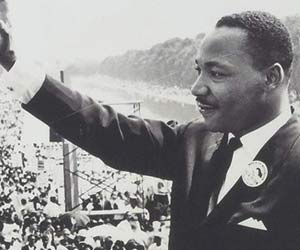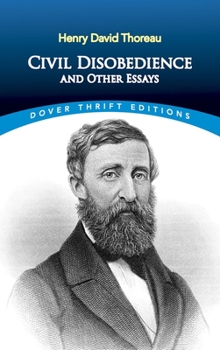Civil Disobedience, and Other Essays
Select Format
Select Condition 
Book Overview
Philosopher, naturalist, poet and rugged individualist, Henry David Thoreau (1817-1862) has inspired generations of readers to think for themselves, to follow the dictates of their own conscience and to make an art of their lives. This representative sampling of his thought includes five of his most frequently cited and read essays: Civil Disobedience, his most powerful and influential political essay, exalts the law of conscience over civil law...
Format:Paperback
Language:English
ISBN:0486275639
ISBN13:9780486275635
Release Date:May 1993
Publisher:Dover Publications
Length:96 Pages
Weight:0.65 lbs.
Dimensions:0.3" x 5.3" x 8.2"
Age Range:14 years and up
Grade Range:Grade 9 and higher
Customer Reviews
6 ratings
Too many scribbles
Published by DianaK , 9 months ago
This copy was so marked up it was hard to read the first chapter. Have to get a better copy.
When the State is Unjust
Published by Thriftbooks.com User , 14 years ago
Civil Disobedience (Original Title: Resistance to Civil Government) by Henry David Thoreau (1817-1862) This essay was written at a time when slavery was still legal and the United States military had invaded Mexico, serving as a catalyst for Thoreau's dissent against an unjust government. His focus is on the primacy of the individual - and he disagrees that the individual should "serve" the State, especially when the state is unjust. Some of his memorable quotes include: -- The mass of men serve the State thus, not as men mainly, but as machines, with their bodies. -- (The state) is not armed with superior wit or honesty, but with superior physical strength. I was not born to be forced. -- When I meet a government which says to me, "Your money or your life," why should I be in haste to give it my money? Ironic as it seems, what was written by Thoreau about the Congress in 1849 is still true today: "Our legislators have not yet learned the comparative value of free trade and of freed, of union, and of rectitude, to a nation. They have no genius or talent for comparatively humble questions of taxation and finance, commerce and manufactures and agriculture. If we were left solely to the wordy wit of legislators in Congress for our guidance, uncorrected by the seasonable experience and the effectual complaints of the people, America would not long retain her rank among the nations." Thoreau concludes that "there will never be a free and enlightened State until the State comes to recognize the individual as a higher and independent power, from which all its own power and authority are derived, and treats him accordingly." This could serve as a primer for the Tea Party Movement! Dr. B Leland Baker, author of Tea Party Revival, The Conscience of a Conservative Reborn Tea Party Revival - The Conscience of a Conservative Reborn: The Tea Party Revolt Against Unconstrained Spending and Growth of the Federal Government
excellent
Published by Thriftbooks.com User , 15 years ago
Thoreau's writing on "Duty of Civil Disobedience" is brilliant! I have LONG been a fan of the writings of HDT and once journeyed to Walden to see the cabin he lived in but a brief time. This book is so often cited as required reading among those who advocate non-violent protests. While I clearly see why it provides useful information for these purposes, I found myself disappointed by the rustic, "whiskey-rebellion" kind of thinking of anti-taxation given that he also advocates the reader's taking benefits from the state. I'm now conflicted. I find the writings and man a genius, even in those instances in which I disagree with the extent of his anti-taxation position.
Take back your power
Published by Thriftbooks.com User , 17 years ago
Though many statements Thoreau has made seem a little flakey around the edges, when it came to free will and individual choice he had the right idea and the courage to see it through. The importance of centralizing power within oneself is perhaps more important today than ever when unrestrained government in partnership with multinational corporations weild enormous destructive power. A book that has not lost its relevance.
". . . the most American of us all"
Published by Thriftbooks.com User , 22 years ago
Henry David Thoreau (1817-1862), in his essays, expressed a point of view which continues to be relevant not only in the United States, but in any society that values civil liberties and democratic ideals. "Civil Disobedience and Other Essays," from Dover Publications, brings together the title essay along with four other pieces: "Slavery in Massachusetts," "A Plea for Captain John Brown," "Walking," and "Life Without Principle."Reading Thoreau's work, I was struck by how much some of his ideals are echoed by a later United States activist: the Rev. Martin Luther King, Jr. Thoreau was passionately opposed to slavery. He also cast a critical eye on the concept of majority rule, and was concerned about the place of a minority within an unjust system of laws. He has some noteworthy thoughts on the U.S. Constitution.Thoreau is not just a "theoretical" radical; in the title essay he reflects on a night he spent in jail as a result of his civil disobedience (that event inspired the excellent play "The Night Thoreau Spent in Jail," by Jerome Lawrence and Robert E. Lee). Thoreau's voice is still strong after all these years, and deserves to be heard by contemporary audiences. One final note: In his defense of the militant abolitionist John Brown, Thoreau describes Brown as "the most American of us all." I think that such a description also fits Thoreau himself.
Begone Socrates...
Published by Thriftbooks.com User , 22 years ago
This book is not only great unto itself, but it is a phenominal counterpoint to Socrates' Crito. Socrates speaks about our supposed contractual duty to obey the law, no matter what the laws say; Thoreau stands for no such thing. We would never buy into anything that aimed to harm us, and this book explores such a notion. On its own, this book is fantastic. Coupled with the Crito, you get an interesting look at whether or not civil disobedience is acceptable.
Resistance to Civil Goverment (Civil Disobedience) Mentions in Our Blog

The Creativity of Captivity
Published by Ashly Moore Sheldon • April 15, 2020
This week marks the anniversary of Martin Luther King’s eleven-day imprisonment in Birmingham Jail. The treatise he wrote there became an important touchstone for the American Civil Rights Movement. But this is only one of many great works written within the confines of a cell.





